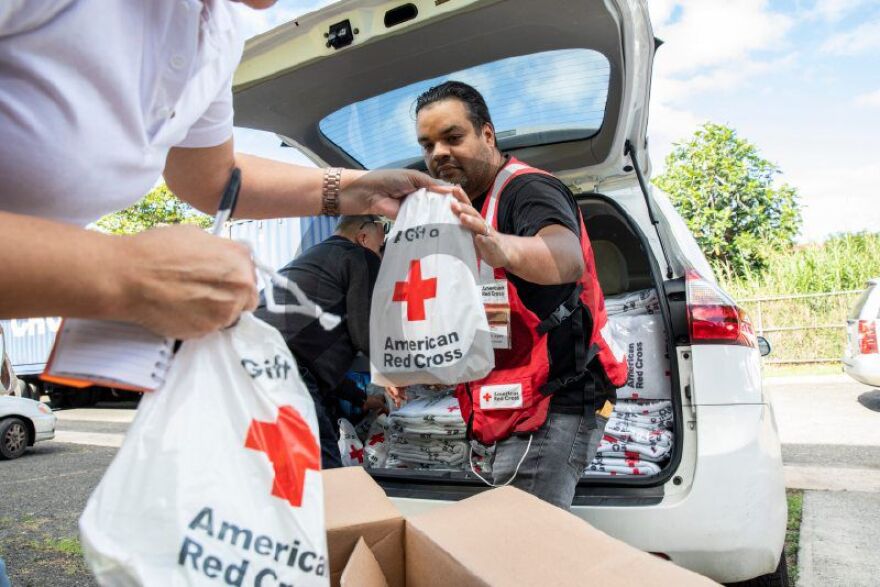To prevent the spread of COVID-19, the Centers for Disease Control and Prevention recommends to keep a safe social distance and to wash hands regularly. But, for many Americans already adhering to those recommendations, a feeling of helplessness can creep in.
Here are some other ways to help during the coronavirus pandemic.
1. Donate To Charity
Charities that provide meal assistance are among those experiencing the most critical need. Nearly 60% of North Carolina public school students qualify for free or reduced price meals at school, but with students now staying home, those meals are not available.
Food Bank of Central and Eastern North Carolina and Inter-Faith Food Shuttle have set up crisis responses and have asked for donations to help offset the need.
"While we are currently experiencing unforeseen volunteer cancellations, we are working to develop plans that will enable us to continue providing needed services," according to Inter-Faith Food Shuttle.
Other charities have seen a dramatic reduction in volunteers as well, and are asking for donations to make up the difference.
"Right now we really need everyone's help," said Habitat for Humanity of Wake County President Bill Ahern.
Habitat of Wake moved its largest fundraising event of the year online, and Ahern said a drop in donations would impact the people Habitat serves.
"While we struggle to continue serving our mission, the people we serve are among the hardest hit by this crisis," he said. "They are seniors who depend on our home preservation program to keep them safe and healthy in their homes. And they are the families striving for a foothold in an unforgiving homeownership market. And they are our service providers, our health care workers. They are the people at the front lines for whom a lost paycheck or lost childcare can be disastrous."
Of course, that's true for all charities, not just Habitat.
The United Way of the Greater Triangle has activated a rapid response fund specifically targeted to those affected by COVID-19. Donations will support Wake, Durham, Orange, and Johnston County residents needing access to critical resources including food, hygiene, childcare, and housing assistance.
Some charities require in-person interaction, and say they have taken extreme precautionary measures. For example, The American Red Cross is in need of blood donations. In the eastern Carolina region alone, some 49 blood drives have been canceled, resulting in 1,800 fewer blood donations, according to the Red Cross.
"In our experience, the American public comes together to support those in need during times of shortage and that support is needed now more than ever during this unprecedented public health crisis," said Red Cross Biomedical Services President Chris Hrouda. "Unfortunately, when people stop donating blood, it forces doctors to make hard choices about patient care, which is why we need those who are healthy and well to roll up a sleeve and give the gift of life."
The Red Cross has increased safety protocols including:
- Checking the temperature of staff and donors before entering a drive to make sure they are healthy.
- Providing hand sanitizer for use before the drive, as well as throughout the donation process.
- Spacing beds, where possible, to follow social distancing practices between blood donors.
- Increasing enhanced disinfecting of surfaces and equipment.
"We know that people want to help, but they may be hesitant to visit a blood drive during this time. We want to assure the public that blood donation is a safe process, and we have put additional precautions in place at our blood drives and donation centers to protect all who come out," said Hrouda.
2. Don't Spread Misinformation
With many more people staying home, it's natural to browse social media sites more often. Unfortunately, that can lead to the spread of misinformation, according to Peter Adams with the News Literacy Project. That ranges from well-intentioned people who accidentally share information that's false, to bad actors who are looking to capitalize on panic.
"The No. 1 thing people have to look out for is the source," Adams told Michael Martin on All Things Considered. "If they can't tell what the source of the information is, to just disregard it and to go to a verified authoritative source. The equivalent of taking 20 seconds in washing your hands is very much the same in the information space, where if you take 20 seconds, investigate the source, do a quick Google search, stay skeptical, we can eliminate a great deal of the confusion of misinformation out there."
According to News Literacy Project's coronavirus page, a false claim about a cure might cause some to downplay the virus. Or even something initially posted as a joke can take on a life of its own and ultimately be taken seriously. "Remember, 'likes' are also known as 'passive sharing,' because many platforms' algorithms suggest things you 'like' to your followers," according to News Literacy Project.
3. Stay Secure Online
In addition to helping others, you can help your company by staying vigilant about cyber security. Most Internet connections at home aren't as safe as those at work, potentially opening up side doors for cyber criminals to access sensitive information.
"With remote workstations becoming increasingly prevalent due to the COVID-19 pandemic, it is critical North Carolina businesses ensure the security of their networks by properly protecting devices being used by remote employees," said Rob Cheng, CEO of cybersecurity firm PC Matic.
The company announced Tuesday it will offer its suite of enterprise-level cybersecurity and remote-management tools free of charge to North Carolina companies who are implementing work from home policies in response to the ongoing threats of COVID-19.









